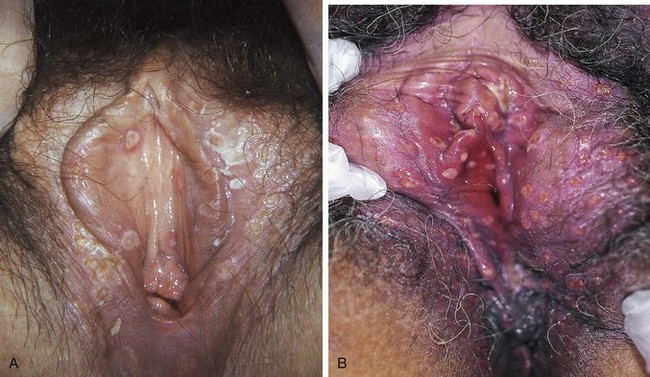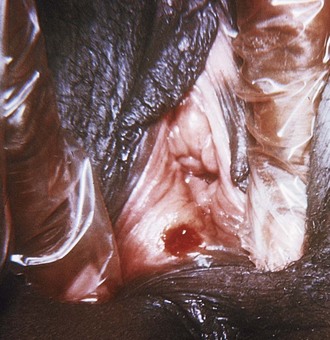126 Gynecologic Infections
• Not all gynecologic infections, including pelvic inflammatory disease, are sexually transmitted, although many are. They are often asymptomatic in women and their sex partners.
• Sexually transmitted diseases are common, particularly in young, sexually active women with multiple sex partners.
• A careful history, physical examination, and diagnostic tests are important to differentiate gynecologic infections because modalities of treatments vary.
• Microscopic diagnosis of yeast infections has a sensitivity of only 50% and fails to diagnosis the disorder in a large percentage of patients with symptomatic vulvovaginal candidiasis.
• Most young, sexually active patients with genital ulcers have a genital herpes infection; syphilis or chancroid disease should be considered as well.
• Treatment should be instituted for most gynecologic infections based on the presumed diagnosis because many patients with genital infections will not have a laboratory-confirmed diagnosis.
• Gonorrhea is becoming increasingly resistant to antibiotics; the clinician should check local susceptibilities before treatment.
Epidemiology
Gynecologic infections are often asymptomatic in women, and the majority of these infections are transmitted sexually. In 2009, the Centers for Disease Control and Prevention (CDC) reported approximately 19 million new sexually transmitted infections with an estimated cost of $16.4 billion annually.1 Many cases of sexually transmitted diseases in the United States, such as human papillomavirus (HPV) and genital herpes, are not reported to the CDC.
Diseases Characterized by Genital Ulcers
Chancroid
Epidemiology
The number of reported cases of chancroid in the United States has varied for the past 10 years but remains very low. Only 28 cases were reported domestically in 2009.1
Pathophysiology
Chancroid, a sexually transmitted disease caused by the short gram-negative bacillus Haemophilus ducreyi, is characterized by painful genital ulcers and painful lymphadenopathy.2 The incubation period is 4 to 7 days.
Treatment
Several treatment regimens have been recommended and are listed in Box 126.1.3,4
Box 126.1 Recommended Treatment Regimens for Chancroid
Ceftriaxone, 250 mg intramuscularly once
Ciprofloxacin, 500 mg orally twice per day for 3 days*
Erythromycin base, 500 mg orally three times per day for 7 days
Granuloma Inguinale (Donovanosis)
Treatment
Herpes Simplex Virus
Epidemiology
HSV is widespread in the United States, with approximately 50 million people infected,5 and it is the most common cause of genital ulcers. The overall domestic seroprevalence of subtype 2 (HSV-2) is 16.2%, but infection rates are considerably higher (39.2%) in African Americans.1 HSV-2 is the most common variant causing genital infections, but subtype 1 (HSV-1) is the causative agent in up to 10% to 15% of all cases.1
Pathophysiology
Two types of HSV may cause genital herpes: HSV-1 and HSV-2. Once acquired, genital herpes becomes a lifelong infection. Herpes simplex is a DNA virus with an incubation period ranging from 2 to 7 days.5 Transmission occurs through exposure to infectious secretions of mucosal surfaces or through skin microabrasions during sexual contact.
Presenting Signs and Symptoms
Of all HSV-2 infections studied, 81.1% were reported to be asymptomatic or were not recognized.5 Symptoms usually begin with painful lesions that are often described as burning (Fig. 126.1). These lesions begin as vesicles and then rupture to expose an ulcerated base that persists for 1 to 2 weeks before crusting over and healing without scars. The vesicles and ulcers contain many highly infectious virus particles, and viral shedding occurs until the lesions disappear. Vulvar lesions may last for 3 or more weeks before complete healing. The cervix and vagina may also be involved, with a gray, necrotic cervix and profuse leukorrhea. External dysuria is common, and bilateral inguinal lymphadenopathy is usual.

Fig. 126.1 Primary herpes simplex.
(From Habif TP. Clinical dermatology. 4th ed. Philadelphia: Mosby; 2004.)
Treatment
Treatment of HSV infection is dependent on the onset of clinical symptoms (acute versus recurrent) and their frequency, which determines the need for suppressive therapy (Box 126.3).
Box 126.3
Treatment Regimens for Herpes Simplex Virus
A. Initial infection (first episode): Recommended regimens for initial infection should be given orally for 7 to 10 days (may be extended if healing is incomplete).
B. Recurrent infection (episodic treatment): Recommended regimens are given orally.
C. Suppressive therapy: Given for frequent recurrent infections and includes several recommended oral regimens.
From Centers for Disease Control and Prevention. Sexually transmitted diseases treatment guidelines, 2010. Atlanta: U.S. Department of Health and Human Services; 2010. Available at http://www.cdc.gov/mmwr/preview/mmwrhtml/rr5912a1.htm. Accessed May 30, 2012.
Lymphogranuloma Venereum
Epidemiology
LGV is rarely reported in developed countries—perhaps in part because of the lack of a standardized diagnostic test or surveillance requirements. However, outbreaks have been reported in populations of homosexual men in Western Europe and North America since 2003, with the largest cluster of case reports occurring in the United Kingdom and New York City.6
Treatment
Box 126.4 details the treatment regimen for LGV.
Box 126.4
Treatment Regimens for Lymphogranuloma Venereum
A. Recommended regimen: It is the preferred treatment.
B. Alternative regimen: Recommended regimens are given orally.
From Centers for Disease Control and Prevention. Sexually transmitted diseases treatment guidelines, 2010. Atlanta: U.S. Department of Health and Human Services; 2010. Available at http://www.cdc.gov/mmwr/preview/mmwrhtml/rr5912a1.htm. Accessed May 30, 2012.
Syphilis
Epidemiology
Rates in women increased from 0.8 case per 100,000 in 2004 to 1.4 cases per 100,000 in 2009 despite a previously decreasing incidence.1
Pathophysiology
Syphilis is a systemic, sexually transmitted disease caused by the spirochete Treponema pallidum. It can also be acquired congenitally. The risk for transmission following sexual exposure depends on many factors and is estimated to be about 30%.7 T. pallidum causes infection after traversing mucous membrane surfaces or denuded skin and then extending systemically through hematogenous and lymphatic routes.
Presenting Signs and Symptoms
Syphilis can be seen in the ED in any of the four stages through which untreated syphilis can pass. Primary infection is manifested as a single, painless ulcer, usually within 3 weeks but sometimes 2 to 3 months after infection. The labia and vaginal walls are most often affected; however, lesions can also occur on the cervix (Fig. 126.2). Secondary syphilis is associated with a characteristic maculopapular generalized rash on the palms and soles and may include components of arthralgia, pharyngitis, and lymphadenopathy. This stage is typically seen 4 to 10 weeks after the initial appearance of a chancre. Infectivity can occur in the first two stages (up to 2 to 4 years following infection).
The fourth stage—tertiary syphilis—has numerous neurologic, cardiovascular, and other systemic effects and develops in about 25% of untreated patients.6
Treatment
Penicillin remains the mainstay of treatment across the board (Box 126.5). According to the CDC guidelines, parenteral penicillin is considered to be the only treatment documented to be efficacious in pregnancy.3 Treatment with penicillin is the same as for the corresponding stage of syphilis in nonpregnant women. For pregnant patients who are allergic to penicillin, tetracycline and doxycycline are contraindicated. Pregnant patients who are allergic to penicillin should be skin-tested and desensitized.
Box 126.5
Treatment Regimens for Syphilis
A. Primary and secondary infections:
C. Tertiary syphilis (with no evidence of neurosyphilis): For example, patients with gumma and cardiovascular syphilis.
From Centers for Disease Control and Prevention. Sexually transmitted diseases treatment guidelines, 2010. Atlanta: U.S. Department of Health and Human Services; 2010. Available at http://www.cdc.gov/mmwr/preview/mmwrhtml/rr5912a1.htm. Accessed May 30, 2012.
Diseases Characterized by Vaginal Discharge
Bacterial Vaginosis
Epidemiology
Although the range is wide, depending on the population, prevalence rates for bacterial vaginosis (BV) have been estimated to be 4% to 40%. However, because Gardnerella vaginalis is present in 50% to 70% of asymptomatic women, the exact incidence of BV is difficult to estimate.8
Stay updated, free articles. Join our Telegram channel

Full access? Get Clinical Tree







